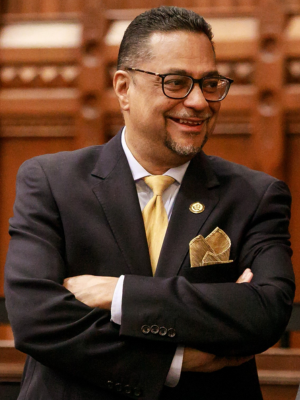2024-13
Healthy Universal School Meals
Sponsored by
Rep. Geraldo Reyes (CT), Rep. María Isa Pérez Vega (MN),
Sen. Leo Jaramillo (NM), Rep. Carlos González (MA), Sen. Adam Gómez (MA),
Sen. Sonya Jaquez Lewis (CO), Asw. Sandra Jauregui (NV), Sen. Luz Escamilla (UT),
Asw. Jessica González-Rojas (NY), Rep. Lillian Ortiz-Self (WA), Rep. Ángel Matos (PR)
Rep. Juan Candelaria (CT), Sen. Gustavo Rivera (NY), Del. Deni Taveras (MD),
Asw. Yvonne López (NJ), Rep. Veronica Paiz (MI), Sen. Cristina Castro (IL) and
Sen. Wlnsvey Campos (OR)
Reported to the Caucus by the NHCSL Education Task Force
Sen. Teresa Ruiz (NJ), Chair
Unanimously ratified by the Caucus on November 23, 2024
WHEREAS, in Resolution No. 2018-20, End School Lunch Shaming, this Caucus broadly supported “legislation that allows children to receive an education without going hungry or getting bullied, stigmatized, or humiliated for not being able to afford the school lunch or because their parent or guardian forgot to make a payment,” along with several policies to improve the reduced cost or free lunch application process and the debt collection process; and,
WHEREAS, in that resolution, the Caucus underscored that the research at the time showed that Hispanic children were the group most likely to be eligible for free or reduced-price school meals but not be receiving them,[1] but more recent research[2] has shown that those disparities have disappeared;[3] and,
WHEREAS, more recent efforts to automatically enroll Medicaid recipients (DCM-F/RP) in the National School Lunch Program (NSLP) and School Breakfast Program (SBP) proved successful in increasing the percentage of meals served for free in most states studied,[4] but many students still do not benefit from school meals; and,
WHEREAS, while there is no stand-alone nutrition comparison data for the breakfast program, USDA research found that NSLP participants eat significantly more whole grains than nonparticipants,[5] and greater servings of whole grains are “significantly related to higher scores in reading comprehension and fluency and mathematics” in elementary schoolchildren;[6] and,
WHEREAS, universal school meals benefit all students because when even one student in a classroom is hungry it can disrupt learning for all students;[7] and,
WHEREAS, using state funds,[8] eight states, California, Colorado, Massachusetts, Maine, Michigan, Minnesota, New Mexico and Vermont have implemented permanent Healthy School Meals for All policies, offering a free breakfast and lunch to all students, regardless of household income; Connecticut and Nevada offered universal free meals only for the 2022-23 and 2023-24 school years;[9] and New Jersey significantly expanded eligibility for free meals but not yet universal meals; while in New York, the cities of New York City, Albany, Rochester and Yonkers offer universal school meals;[10] and,
WHEREAS, a bill before Congress, the Universal School Meal Program Act (S.1568/H.R.3204) would create a permanent nationwide federally-funded Healthy School Meals for All program, increase reimbursement rates for school meals, end lunch shaming, reimburse schools for meal debt, provide incentives for local food procurement, expand summer meal access, and expand the Child and Adult Care Food Program; and,
WHEREAS, the American Academy of Pediatrics, the Academy of Nutrition and Dietetics, the American Heart Association, the National PTA, the American Federation of Teachers and the National Education Association have joined the Healthy School Meals for All Coalition, supporting the Universal School Meal Program Act in Congress and other less ambitious bills that would all expand access to school meals.[11]
THEREFORE, BE IT RESOLVED, the National Hispanic Caucus of State Legislators calls on states to enact Healthy School Meals for All policies and calls on Congress to enact the Universal School Meal Program Act or similar legislation, ensuring it includes the territories.
THE NHCSL EDUCATION TASK FORCE, IN ITS MEETING OF OCTOBER 10, 2024, UNANIMOUSLY RECOMMENDED THIS RESOLUTION TO THE EXECUTIVE COMMITTEE FOR APPROVAL. THE EXECUTIVE COMMITTEE UNANIMOUSLY APPROVED THIS RESOLUTION AT ITS MEETING OF OCTOBER 18, 2024.
THE NATIONAL HISPANIC CAUCUS OF STATE LEGISLATORS UNANIMOUSLY RATIFIED THIS RESOLUTION AT ITS ANNUAL MEETING OF NOVEMBER 23, 2024 IN DENVER, COLORADO.
[1] Elizabeth Condon, et al. (2015). Diet Quality of American School Children by National School Lunch Participation Status: Data from the National Health and Nutrition Examination Survey, 2005–2010, (USDA).
[2] Published years after the resolution but covering the years prior to it.
[3] Gleason, S., Hansen, D., Kline, N., Zvavitch, P., & Wakar, B. (2022). Indicators of diet quality, nutrition, and
health for Americans by program participation status, 2011–2016: NSLP final report. Prepared by Insight
Policy Research. U.S. Department of Agriculture, Food and Nutrition Service, Office of Policy Support.
[4] Hulsey, Lara, Andrew Gothro, Joshua Leftin, Claire Smither Wulsin, Liana Washburn, Kelsey Chesnut, and Leah Jennings. (2022). Direct Certification with Medicaid for Free and Reduced-Price Meals (DCM-F/RP) Demonstration, School Year 2019–2020 Report. Prepared by Mathematica, Contract No. AG-3198-B-16-0004/12319819F0021. Alexandria, VA: U.S. Department of Agriculture, Food and Nutrition Service, Office of Policy Support.
[5] U.S. Department of Agriculture, Food and Nutrition Service, School Nutrition and Meal Cost Study Final Report Volume 4: Student Participation, Satisfaction, and Dietary Intakes by Mary Kay Fox et.al. Project Officer, John
Endahl, Alexandria, VA: April 2019.
[6] Ptomey LT, Steger FL, Schubert MM, Lee J, Willis EA, Sullivan DK, Szabo-Reed AN, Washburn RA, Donnelly JE. Breakfast Intake and Composition Is Associated with Superior Academic Achievement in Elementary Schoolchildren. J Am Coll Nutr. 2016 May-Jun;35(4):326-33. doi: 10.1080/07315724.2015.1048381. Epub 2015 Dec 23. PMID: 26697955; PMCID: PMC4896496.
[7] Caitlyn Meisner, Massachusetts Joins Short List of States Providing Free School Meals to All (Education Week, Aug. 16, 2023).
[8] Each state has unique ways of funding the programs, from special taxes approved by referendum to general fund appropriations.
[9] Food Research and Action Center (FRAC) – legislation to make the programs permanent has been introduced in those two states.
[10] Marissa Sheldon, MPH, States that Have Passed Universal Free School Meals (So Far) – *Update* (Hunter College New York City Food Policy Center, April 9, 2024).


